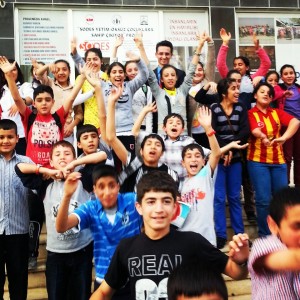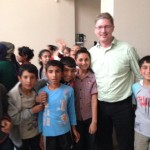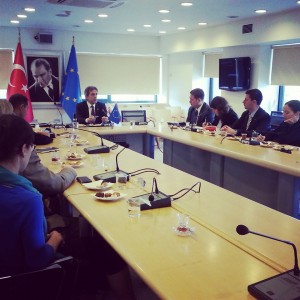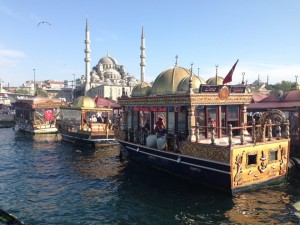Fethullah Gulen, in interview with the Wall Street Journal speaks out against Recep Tayyip Erdogan
By Alan Cullison
July 14, 2017 4:24 p.m. ET
SAYLORSBURG, Pa.—The reclusive cleric who was accused by Turkish President Recep Tayyip Erdogan of planning a coup attempt one year ago from his gated U.S. compound urged in a rare interview that the West stand up to what he called Turkey’s increasingly authoritarian leader.
[Read more Gulen interviews and op-eds here - including New York Times, Washington Post, Wall Street Journal, BBC, Politico, Asharq Al-Awsat, Le Monde, Reuters and many more ]
In an ornate conference room in his home in the Pocono Mountains, the cleric Fethullah Gulen repeated his declaration that he has never been involved in any coup-plotting. He decried Mr. Erdogan for launching a purge within Turkey, the brunt of which has fallen on his followers.
Fethullah Gulen, shown on Wednesday in Saylorsburg, Pa., criticized Turkey’s president for his crackdown following a failed coup one year ago. Photo: Sasha Maslov for The Wall Street Journal
“I never thought that he could go so bad,” said Mr. Gulen, who said that the Turkish president was unleashing mass hysteria inside the country. “Some parts of Turkish society have lost their ability to think.”
Since last July, Turkey has arrested or driven from their jobs tens of thousands of people Turkish authorities accuse of supporting Mr. Gulen. The government has closed hospitals and schools affiliated with his social movement, Hizmet, which translates roughly as “service.”
The Turkish government said it has seized up to $4 billion in property previously owned by businessmen or foundations alleged to be linked to the movement.
“Nothing like this has been seen before in Turkey,” Mr. Gulen said. “It can only be compared with Lenin and Stalin or Saddam in Iraq.”
Turkey is now investigating 160,000 people, and 50,000 have been arrested, with 48,000 of them released, according to Turkey’s ambassador to the U.S., Serdar Kilic. There are outstanding arrest warrants for about 8,000 people, he said.
In a news conference held Friday to commemorate the first anniversary of the coup attempt, Mr. Kilic supported the country’s extended state of emergency, saying Mr. Gulen’s followers have spent decades in the ranks of government and it would take time to remove them.
Mr. Kilic continued to blame Mr. Gulen for organizing last July’s failed plot, and pressed Turkey’s demand for extradition.
TOP: A soldier accused of attempting to assassinate Turkish President Tayyip Erdogan on the night of the failed July 15, 2016 coup is carried to a Turkish courthouse. BELOW: Turkish President Recep Tayyip Erdogan speaks during a ceremony marking the failed coup, in Ankara on Thursday. Photo: kenan gurbuz/Reuters (TOP) ; Adem Altan/Agence France-Presse/Getty Images (ABOVE)
He said he saw “more willingness” on the part of the Trump administration to entertain the extradition request, but that the process is “not moving as fast” as Turkey would like.
Wyn Hornbuckle, a Justice Department spokesman, declined to comment Friday, saying the Justice Department doesn’t speak publicly about extradition requests.
“I believe that there are certain measures that the U.S. authorities can take,” Mr. Kilic said, “including limitations on his activities in the United States. He’s still freely giving interviews to newspapers. This is not freedom of expression, he’s accusing the Turkish government, he’s sending messages to his supporters in Turkey and he is still traveling.”
Mr. Gulen said that his movement is also coming under pressure outside of Turkey as Ankara tries to persuade countries to shut down his movement’s schools in other countries. Many governments have refused, his aides said, but others have been currying favor with Ankara by shutting down schools and transferring property to the Turkish government.
Mr. Gulen described what he called rising chauvinism and racism in Turkey—as well as Europe and the U.S.—but said traditional institutions weren’t addressing them head on. “NATO has a potential, the European Parliament has a potential,” he said. “But in their current state they don’t seem to be addressing these problems right now.”
On July 15, 2016, mutinous elements of the Turkish military took to the streets, tanks opened fire on civilians and jet fighters bombed parliament as part of the unsuccessful coup attempt, during which commandos also made a botched effort to catch or kill the Turkish president. More than 240 people died in the violence.
The Turkish government alleges that Mr. Gulen’s followers in his homeland have been plotting for years to take over the state through powerful positions in the military and judiciary and across the civil service. Authorities in Ankara liken him to a cult leader.
Mr. Gulen, who has been a resident of the U.S. since 1999, said he supports a modern and moderate version of Islam that supports democracy, science and tolerance.
His presence in the U.S. was an early quandary for President Donald Trump, who sought closer relations with Turkey and whose former national security adviser, Mike Flynn, had performed lobbying work on behalf of the Turkish government.
Aides to Mr. Gulen said they think any extradition to Turkey is less likely after the resignation of Mr. Flynn, who had failed to disclose the extent of his contacts with foreign officials.
In the interview, Mr. Gulen said that the Turkish president’s authoritarian streak was on display during his visit to Washington earlier this year, when Mr. Erdogan’s personal bodyguards attacked protesters outside the Turkish Embassy. Federal prosecutors in the U.S. later filed charges against at least 10 members of the detail.
“They are not like guards, they are like assassins who are so devoted to their leader that they will not refrain from shooting people,” he said.
The Turkish Embassy said at the time that the Erdogan supporters were responding in self-defense to terrorist sympathizers.
Mr. Gulen—a powerful orator known as the Hocaefendi, or respected teacher, by his followers—has written numerous books and delivered emotional video speeches.
His group, formed at a time when Turks feared religious persecution by a secular government, has often been cagey about its membership, contributing to allegations that he in fact was running a secret cult.
Graham Fuller, former vice chairman of the U.S. National Intelligence Council who has defended Mr. Gulen’s movement as a positive force for moderate Islam in today’s world, said the allegation is no longer deserved. “Over the last decade or more it has had a very public face,” he said.
In Turkey, Gulenists have spread throughout state institutions such as the courts and the military “to ensure these institutions would not be used against them again,” said Mr. Fuller, who in 2006 wrote a letter to the FBI defending Mr. Gulen against attempts to extradite him.
Mr. Gulen in Saylorsburg on Wednesday. Photo: Sasha Maslov for The Wall Street Journal
—Felicia Schwartz contributed to this article.
Write to Alan Cullison at alan.cullison@wsj.com
Appeared in the July 15, 2017, print edition as ‘Turkish Cleric Assails President.’
Rumi Forum's blog on Hizmet, Fethullah Gulen, peacebuilding, education and interfaith efforts.
Showing posts with label Fethullh Gulen. Show all posts
Showing posts with label Fethullh Gulen. Show all posts
Thursday, July 27, 2017
Saturday, September 6, 2014
Fethullah Gulen Statement on ISIS
I deplore the brutal atrocities being committed by the ISIS terrorist group hiding behind a false religious rhetoric and join the people of conscience from around the world in calling for these perpetrators to immediately cease their cruel and inhuman acts. Any form of attack, suppression or persecution of minorities or innocent civilians is an act that contradicts the principles of the Qur’an and the tradition of our Prophet upon whom be peace and blessings.
ISIS members are either completely ignorant of the spirit of Islam and its blessed messenger, or their actions are designed to serve their individual interests or those of their political masters. Regardless, their actions represent those of a terrorist group and they should be labeled as such and be brought to justice.
The goal of religion is to establish peace based on universal human rights, rule of law and high human values in the world. Any interpretations to the contrary, including the abuse of religion to help fuel conflicts, are either false or deceitful. In true Islamic thought based on its core principles, every mean to a legitimate end should also be legitimate itself. To think or act otherwise is nothing but Machiavellism.
I send my heartfelt condolences to the families and friends of the deceased in Iraq and Syria, and to the family and friends of the slain journalist James Foley. May God give them patience and perseverance, and alleviate their suffering. I pray for the immediate release of other hostages and ask God, the Merciful to lead us all into a world of mutual respect and peace. I invite everybody to join together in this prayer.
Sunday, June 2, 2013
ARTICLE: An Eye-Opening Trek Into Turkish Society
An Eye-Opening Trek Into Turkish Society
WALTER RATLIFF*
May 22, 2013


In Gaziantep, Turkey, the children at a local orphanage were recently asked to write about what they wished for most in life. The exercise was designed to help them think about their goals for the future. However, one child took the answer in a different direction: “I wish my parents could come back for just two hours, so I could show them around and have them meet my friends.”
This anecdote formed perhaps the most poignant moment in our recent visit to Turkey. As an orphanage sponsor told our group the story, our host and translator, Emre Celik, had to take a few moments before he passed the story along to us. There were few dry eyes in the room. Earlier, the children had greeted us with cheers, laughter and singing. But this story brought home the stark realities that these children face every day.
The facility we visited serves about 600 children between the ages of 10 and 18. Most of the children are Kurdish. Before coming to the orphanage, they were in danger of becoming street children, or being recruited by violent rebel groups such as the Kurdish Workers’ Party (PKK). Here, they can continue their education, make friends, and receive counseling. The site we visited is part of a network of orphanages taking care of about 10,000 children in Turkey who have lost one or both parents.

This anecdote formed perhaps the most poignant moment in our recent visit to Turkey. As an orphanage sponsor told our group the story, our host and translator, Emre Celik, had to take a few moments before he passed the story along to us. There were few dry eyes in the room. Earlier, the children had greeted us with cheers, laughter and singing. But this story brought home the stark realities that these children face every day.
The facility we visited serves about 600 children between the ages of 10 and 18. Most of the children are Kurdish. Before coming to the orphanage, they were in danger of becoming street children, or being recruited by violent rebel groups such as the Kurdish Workers’ Party (PKK). Here, they can continue their education, make friends, and receive counseling. The site we visited is part of a network of orphanages taking care of about 10,000 children in Turkey who have lost one or both parents.

The counselors work hard to engage new children coming to the facility. They also watch for danger signs. The biggest concern among the staff is that a new children will emotionally withdraw into themselves. Developing a habit of withdrawal after an emotional trauma can have long term negative consequences. The staff and other children work hard to give the new kids a sense of care and belonging. This is as important to their health as any educational program the school has to offer. Caring, reciprocal relationships matter. Like a recent Harvard study (unsurprisingly) concluded:Happiness is love. Full Stop.
The orphanage visit was part of a week-long study fellowship for DC-area Ph.D. students. The trip gave us an inside look into many key segments of Turkish government and society. Our visits ranged from Turkey’s foreign affairs brokers in Ankara, to the country’s leading newspaper in Istanbul, to businesses, relief organizations and think tanks located around the country.
Many of the organizations we visited were part of what its popularly called the Gülen Movement. Its members refer to it as Hizmet, which simply means “the service.” It is perhaps the most powerful civil society group in Turkey. The founder, Fethullah Gülen, is a Muslim public intellectual and cleric who advocates what The Economist described as “pacifist, modern-minded Islam, often praised as a contrast to more extreme Salafism.”Hizmet members shun political office in favor civil society projects. They run large universities, hugely popular media outlets and influential non-governmental organizations. They remind me of Christian groups that have established universities, hospitals, NGOs and civil society organizations throughout the history of the United States. Faith is an important starting point for each member of the Hizmet. At the same time, Gülen advocates a secular government where religious practice is free from state control, and the government holds every religion at an equal distance. He promotes religious freedom for all faiths who wish to participate in the public sphere.

The orphanage visit was part of a week-long study fellowship for DC-area Ph.D. students. The trip gave us an inside look into many key segments of Turkish government and society. Our visits ranged from Turkey’s foreign affairs brokers in Ankara, to the country’s leading newspaper in Istanbul, to businesses, relief organizations and think tanks located around the country.
Many of the organizations we visited were part of what its popularly called the Gülen Movement. Its members refer to it as Hizmet, which simply means “the service.” It is perhaps the most powerful civil society group in Turkey. The founder, Fethullah Gülen, is a Muslim public intellectual and cleric who advocates what The Economist described as “pacifist, modern-minded Islam, often praised as a contrast to more extreme Salafism.”Hizmet members shun political office in favor civil society projects. They run large universities, hugely popular media outlets and influential non-governmental organizations. They remind me of Christian groups that have established universities, hospitals, NGOs and civil society organizations throughout the history of the United States. Faith is an important starting point for each member of the Hizmet. At the same time, Gülen advocates a secular government where religious practice is free from state control, and the government holds every religion at an equal distance. He promotes religious freedom for all faiths who wish to participate in the public sphere.

This places the Hizmet ideology far apart from some Islamist groups who wish for a theocratic state, as well as the Turkey’s historic Kemalist government position, which simultaneously controls religious institutions and removes them from public life. This includes the displacement of religious participation in education and other key sectors of civil society. Gülen promotes religious pluralism, freedom of conscience and fully engaged faith communities as critical components of a healthy society. Civil society is left vulnerable without support from citizens who actively look after its welfare. Just as caring relationships can change the life of an orphan, engagement by service-oriented religious groups can change a nation.
Yet, the trip was more about contemporary Turkey than it was about the Hizmet. Some meetings were disconnected from the movement’s activities, and some included critics of the movement. Each encounter helped us form a picture of Turkish civil life, including some universal concerns. From an editor at Zaman, Turkey’s largest daily newspaper, we learned how both sources and journalists face intimidation from the government, which severely hampers the role of the press in a free society. The morning after we met Zaman’s editors, I received word that the U.S. Justice Department seized AP’s phone records (likely including my own) from our DC, NY and Connecticut offices.
One of the biggest highlights of the trip was getting to know the other participants. It was a “fellowship” in the true sense of the word. We were all scholars with a different research interests studying at a variety of schools. Yet, there was a great deal of mutual respect running through the widely (and sometimes wildly) different personalities. We were able to discuss many points of view in our conversations with each other and the people we met along the journey. We also formed friendships that I hope will last into the years ahead.
Yet, the trip was more about contemporary Turkey than it was about the Hizmet. Some meetings were disconnected from the movement’s activities, and some included critics of the movement. Each encounter helped us form a picture of Turkish civil life, including some universal concerns. From an editor at Zaman, Turkey’s largest daily newspaper, we learned how both sources and journalists face intimidation from the government, which severely hampers the role of the press in a free society. The morning after we met Zaman’s editors, I received word that the U.S. Justice Department seized AP’s phone records (likely including my own) from our DC, NY and Connecticut offices.
One of the biggest highlights of the trip was getting to know the other participants. It was a “fellowship” in the true sense of the word. We were all scholars with a different research interests studying at a variety of schools. Yet, there was a great deal of mutual respect running through the widely (and sometimes wildly) different personalities. We were able to discuss many points of view in our conversations with each other and the people we met along the journey. We also formed friendships that I hope will last into the years ahead.
* Walter Ratliff is a scholar of Religion and the Religions Editor at Associated Press
Subscribe to:
Posts (Atom)

